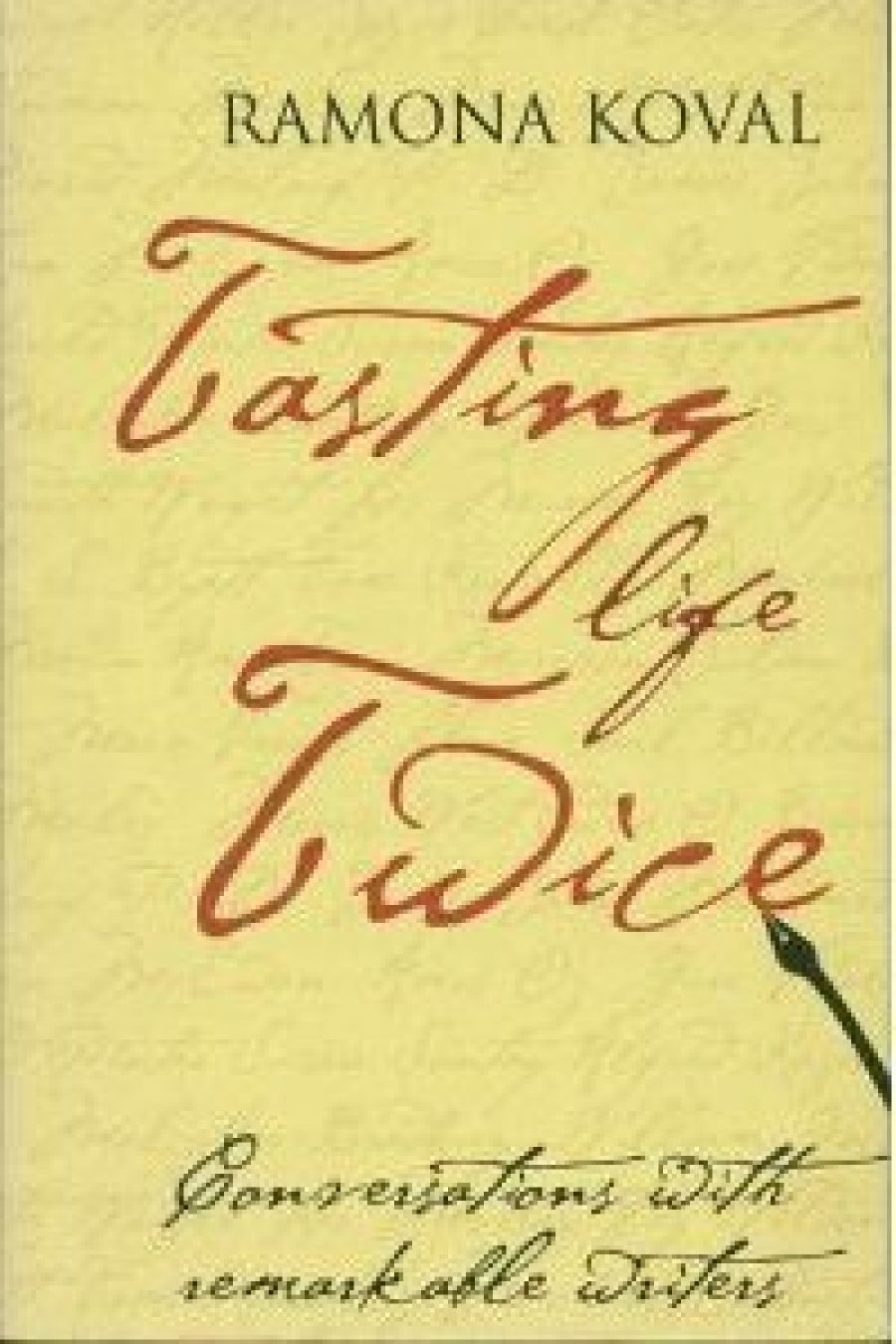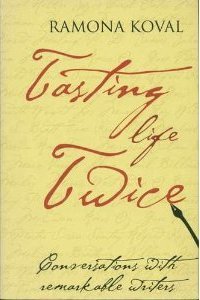
- Free Article: No
- Contents Category: Anthology
- Review Article: Yes
- Article Title: Better you don't ask
- Online Only: No
- Custom Highlight Text:
Tasting Life Twice is a collection of twenty-six interviews conducted by Ramona Koval over the past ten years at literary festivals, on radio programmes and in the homes of such writers as Les Murray, Morris West and Joseph Heller. Any randomly selected shortlist of these writers would impress among them are Toni Morrison, Michael Ondaatje and P.D. James, and some who have recently passed away: Saul Bellow, Susan Sontag and Malcolm Bradbury. Koval, of Radio National’s Books and Writing, is passionate about books and ideas, informing us in the introduction that her interviews revolve around ‘questions of how one evaluates a life, the getting of wisdom, facing death, the meaning of love, and whether a book ever changed the course of history’.
- Book 1 Title: Tasting Life Twice
- Book 1 Subtitle: Conversations with remarkable writers
- Book 1 Biblio: ABC Books, $34.95 pb, 357 pp
- Book 1 Cover Small (400 x 600):

- Book 1 Cover (800 x 1200):

These ‘remarkable writers’ have spent a lifetime attempting to answer those Big Questions, and now do so, by and large, with a sense of having failed in their endeavours. Saul Bellow, who died in April 2005, laments the way ‘the soul is not recognised in the modern world’. But this ‘truth’ is revealed tentatively (‘I’ve never been able to cancel my conviction that there is such a thing as the soul’), as Bellow admits to the difficulty in thinking beyond ‘the example set by science’. In the end, Bellow’s final comment – ‘I don’t know the answers. I only know my answers’ – is intimated in all the interviews.
Koval moves gracefully between philosophical discussion and questions about the writer’s life. As she points out, writers are practised in this subject. Indeed, the somewhat crafted quality of their responses is part of the charm. Amos Oz’s stories about growing up in Israel are too good to be spontaneous. In one, he recollects a postman who left messages on envelopes; comments ranged from ‘never trust the British’ to ‘your washing has been hanging on the line for 3 or 4 days now’. Oz talks candidly about his parents who, when asked, would claim to feel ‘born anew’ by their role in the establishment of a Jewish state, but whose modus operandi was silence and the directive, ‘you better don’t ask’.
Just as the writer performs, so too must the interviewer. In her 1992 collection of interviews, One to One, Koval says she must act out the role of the ‘interested, serious journalist’. This act allows her to anticipate the writer both intellectually and emotionally, leading Sontag to ask: ‘are you telepathic?’ The Joyce Carol Oates interview demonstrates the importance of Koval’s thorough research, as well as her ability to manage the unpredictability of an encounter between strangers. Their discussion – about Marilyn Monroe, writing thrillers under pseudonyms, the ‘physicality of writing’ – is interesting, but it is the subtext that fascinates. Oates begins by giving short, terse answers. When Koval describes moments in Oates’s novels that take the ‘breath away’, the novelist responds: ‘is that a question?’ Koval replies, ‘it’s a kind of conversation, really’, to which Oates says, ‘well, I was waiting for a question mark’. The interviewer remains undeterred, ploughing on to ask about two relatively unknown Oates novels. Oates is confounded (‘you’ve read those? Nobody has read those books’) and everything changes. She becomes sincere, thoughtful and expansive. Early in the interview, Oates evokes the subtext, explaining that when she speaks there is a ‘tickertape’ at work, a kind of italics to the spoken ‘roman type’; a voice that says, ‘what you really mean is …’. Koval – unafraid of risky territory – asks: ‘What are the italics saying now?’
Sitting in his wheelchair and sipping champagne on stage at the Edinburgh festival, John Mortimer speaks warmly of his father. When Mortimer told his divorce-lawyer father that he wanted to be a writer, the latter responded, ‘well, you might be a writer. You might be a moderately successful writer, but consider the horrible life your wife would lead if you were a writer.’ Martin Amis’s charge that the writer becomes a ghost to their own life and that ‘you’ll go down in the evening and say to your wife, “How was your day?” and you’ll add in square brackets, [“as if I give a shit”]’, seems to bear out the divorce lawyer.
Koval wants to reinstate the ‘pleasure principle’ in reading. A.S. Byatt and Judith Wright speak about the value of ‘giving in’ to forces beyond oneself. Literary criticism is sometimes seen as being out to curtail this aspect of reading, and nowhere is this more evident than in discussions around postmodernism and deconstruction. Most of the writers here dismiss such challenges (Koval sees the postmodern condition as equating ‘a holocaust with a circus’).
On the other hand, history looms large in these interviews, such that a belief in aesthetic primacy comes across as somewhat obscene. William Gass argues that ‘everything needs deflating’, and that apparently includes the Holocaust. Koval challenges him on what he sees as a divide between aesthetic and moral codes (in The Tunnel, Gass writes ditties about Jewish people being made into soap), asking: ‘how do you expect me to read this without thinking about what really happened?’ The Harold Pinter, Mario Vargas Llosa and Gore Vidal interviews provide indispensable interpretations of ‘what really happened’, with Vidal and Pinter detailing a corrupt, deceptive and morally contemptible US government. It’s August 2001 when Vidal tells Koval, ‘it’s amazing how seldom’ people retaliate against America.
Even when I found the manner of some writers (Ian McEwan, Sontag) off-putting, I was left wondering at what point those personalities entered the books I had enjoyed. In any case, it is the ideas that dominate here. As if a testament to this, I find myself closing by quoting a (riveting) sexist-egocentric, Norman Mailer, who inadvertently sums up the tickertape running through Tasting Life Twice: ‘truth is a mystery … we approach the truth, we never find it.’


Comments powered by CComment